Newsletter September 2022

|
||||||||||
|
Falls die E-Mail nicht korrekt angezeigt wird, wechseln Sie bitte zur Webseite |
||||||||||
|
Events |
|
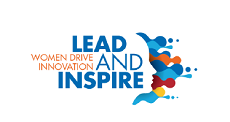
|
Networking event Lead & Inspire under the motto Women Drive Innovation as a hybrid event I 06.10.2022
The Lead & Inspire event series aims to inspire women to pursue careers in medicine and the natural sciences. Novartis Germany has set itself the goal of making women more visible as innovators. On October 6, starting at 2:30 p.m., the fourth networking event will take place as a hybrid event. The event serves as a networking platform for female scientists and female leaders from the clinical, industrial, research and start-up scene. For more information, click here. |

|
herCAREER-Expo I 06./07.10.2022
Networking women, among themselves and with employers - that is the goal of herCAREER. The central part of the platform is the herCAREER Expo, which will take place for the seventh time in Munich on October 6. and 7. The special: The herCAREER makes authentic encounters for recruiting and networking possible.
herCAREER also supports the many opportunities for career changers in the fields of IT and digitization. |
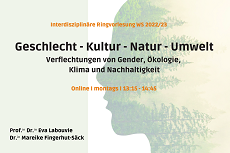
|
Interdisciplinary Lecture Series "Gender - Culture - Nature - Environment" I Start 10.10.2022
The organizers Prof.in Dr.in Eva Labouvie and Dr.in Mareike Fingerhut-Säck would like to present the lecture series "Gender - Nature - Culture - Environment. Interweavings of Gender, Ecology, Climate and Sustainability" to shed light on the manifold aspects and interweavings of the category gender with "doing gender". Climate change, environmental disasters or crises of sustainability are by no means gender neutral. Women, men, and diverse people contribute in different ways, deal with their impacts in different ways, and are unequally affected by their consequences. Thus, questions about the interconnections between gender and climate or environmental crises, and decidedly gendered perspectives, are almost imperative. Likewise, questions can be asked about the connections between gender or gender order and environmental diseases, environmental factors, sustainability, resource distributions, ecological rights, or about gender aspects in environmental and climate protection or design, up to and including the positions of a much-discussed ecofeminism. |
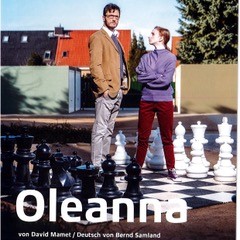
|
Theater in the auditorium "Oleanna" in Magdeburg I 13.10.2022
Theater der Altmark (TdA) presents the play "Oleanna," a two-person play by U.S. author David Mamet, on Oct. 13, 2022, at 7:30 p.m. in Lecture Hall 6, Zschokkestraße, OVGU Magdeburg. The play is set in a university milieu and covers topics such as abuse of power, sexual abuse, gender justice, identity politics and depicts differences between social classes. Due to the topicality of the issues, Mamet's "power play" offers space and opportunities for exciting discussions between students and faculty. Tickets go on sale via the Eventbrite website on Sept. 12, 2022, and more information and tickets are available for 6 or 4 euros at: |
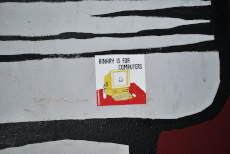
|
2nd MINT Action Days of MINTvernetzt I November 21-24, online
MINTvernetzt invites you from November 21-24, 2022 to the second digital and nationwide MINT Action Days by stakeholders for stakeholders. Various offers and dialog formats on the topics of gender, didactics, MINT+, innovations, and fundraising/financing are planned for the entire day, as well as space for informal exchange. Those who have their own workshops and ideas can also contribute them. All information and contact can be found here. |

|
11th Statewide Day of Gender Research Saxony-Anhalt I November 16-17, Magdeburg and hybrid
Conflicts, Crises, Wars. Feminist perspectives and positioning |

|
ZSM symposium: Ideal Images of Research and Scientific Careers under Discussion I November 11-12, Magdeburg
The ZSM symposium (formerly "Nachwuchstagung") sees itself in the tradition of the Magdeburg Method Workshop as a conference with research workshop character. This takes place in a protected space. Here empirical, theoretical as well as conceptual contributions can be tested with critical constructive feedback from peers. The exchange of ideas is in the foreground. |

|
Network Conference Countering Antifeminism - Strengthening Democracy, Berlin I 17-18 October
The Heinrich Böll Foundation is organizing a network conference in Berlin on October 17 and 18, 2022. The main topics as well as the contents are to be jointly designed by or with participants, which is why the foundation is asking for knowledge and experiences from both research and (civil society) practice. |
Grants and prizes |
|
|
Announcement Karin Witte Prize for Women Scientists I 07.10.2022
Karin Witte (1929-2015) was a committed philanthropist who worked in various fields for charitable purposes and in the spirit of supporting young people at Otto von Guericke University Magdeburg. This is the 5th time that the Karin Witte Award for Women Scientists is being offered as part of the Karin Witte Fund.
Applications should be submitted via: kwf@ovgu.de . |
|
Call for Papers |
|
|
Trans* politics, politics around trans*, and critiques of cis- and trans-normative political relations I Deadline November 30
Since the early 2000s, the term trans*feminism has increasingly been used in international activist contexts and theories. However, within German-speaking social sciences, trans*feminist analyses and critiques have so far been taken up only rarely. Given this, the special issue aims to create a space to explore the potential of trans*feminist analyses in the social sciences and political sciences. Instead of assuming an irreconcilable opposition between ‘cis-feminisms’ and ‘trans*feminisms’, the special issue reflects on the contribution of trans*feminist social sciences: What constitutes a trans*feminist perspective in social sciences? How can feminist knowledge archives can be re-read, re-interpreted and expanded in a way that avoids to reproduce a binary notion of gender? What constitutes trans*feminist politics? What are the implications of trans*feminist perspectives for gender equality policies? What are key elements of trans*feminist analyses of our present times? How have historical struggles, movements andtheories criticized and reworked the heteronormative, colonial system of the binary of gender?
The organizers take the following observations as background of this special issue: Trans*gender people have become more visible in socio-political and feministdebates in recent years. An increased visibility of transgender and gender-nonconforming people can be observed in mass media and in private and public institutions. However, this visibility is structured by intersectional relations of inequalities. Furthermore, pathologizing and stigmatizing representations continue to exist. At the same time, there are steps of legal liberalization and de-pathologization with regard to access to transitional medicine, legal recognition, and legal protection against discrimination. Despite these changes, marginalization and discrimination persist in almost all areas of society and especially in wage labor. In addition, killings of trans*persons and gender-non-conforming people are increasing globally Trans* people and gender-nonconforming people are affected differently by violence and discrimination. In the context of homonationalism and transnationalisms, white trans* people who conform to neoliberal norms are partially included in citizenship.
Meanwhile, QTIBPoC (Queer, Trans*, Inter Black People and People of Color) increasingly face racist security policies and violence. They also work more often in dangerous workplaces or are denied basic human rights as refugees. The coloniality of the neoliberal division of labor deepens trans*phobic and masculinist politics in parts of the Global South, which manifest e.g. in trans*femicidal violence in Central and South America. In the Global North, the significance of class divisions among trans* people emerge in the context of austerity policies: the commodification of public infrastructure and housing, the reprivatization of transitional medicine, and the push for wage labor as the only way to sustain life deepen inequalities among trans* and gender-nonconforming people.
A norm of being trans* and gender non-conforming associated with whiteness, wealth, gender binarity, and ability emerges. It regulates which trans* and gender nonconforming people are considered worthy of protection and recognition and which are not. Analyses and politics that conceive trans* and gender-nonconforming persons as a homogenous group–constituted solely by the category of gender–reproduce these normative and violent relations. Even with regard to the ambivalent transformations on a legal level, it is not clear whether these changes will lead to improvements for trans* and gender conforming persons. Currently, trans*hostile discourses gain momentum, as can be seen e.g. in Germany in the public hatred against Tessa Ganserer, one of the first two openly transgender members of the Bundestag. And it shows on a global scale in trans*hostile positions of the Catholic Church and of right-wing politicians.
The special issue explores these paradoxical and contradictory developments. It aims to furthersharpen trans* and trans*feminist perspectives in the social sciences. The issue aims to show how concepts of political science, social science and social theory can be expanded when trans*, gender-nonconformist, and trans*feminist perspectives are accentuated as part of feminist social science. Furthermore, trans*feminist contemporary analyses are also subject of the special issue. Since we assume that current gender politics can only be understood against the background of historical developments, we alsoask about the genealogies of cis-and transnormative modes of regulations and trans*phobic politics. We are interested in both, continuities and ruptures of trans* and trans*feminist struggles and politics–public politics as well as semi-public and intimate policies such as trans* and gender-nonconformist care.
We want to address the following sets of questions with the special issue:
-What constitutes trans* and trans*feminist epistemologies? How do trans*, gender- nonconformist and trans*feminist perspectives intervene in methodologies and epistemologies of (feminist) political science and social sciences? What new methodologies and epistemologies do they produce? How do trans* and trans*feminist analyses re-articulate notions, concepts, and theories inpolitical science and social sciences?
-How can we grasp the formation and transformation of hetero-cis-normativity as well as the rejection, normalization and regulation of its dis_abled and racialized others? How are norms such as ‘transsexuality’ or ‘transnormativity’ to be understood in light of current and historical intersectional power relations? How do pre/post/colonial and state/post-socialist gender politics overlap in oppressing, enabling, and normalizing of gender nonconformity and transgenderness?
-In what ways did and do the phenomena of transgenderness, gender-nonconformity or transgender people function as tropes of (post-)modernity, state and nation? What roles did and do Eurocentric, (post-)modern, capitalist, (post-)colonial, and (post-)Nazirelations play here? How are state policies around trans* people legitimizing demarcation lines between the Global North and the Global South and between Western and Eastern Europe?
-What are the potentials of trans* and trans*feminist analyses of political, social and economic relations? How do they challenge and transform the understanding of current (post-)colonial gendered and sexualized relations? To what extent do trans*feminist perspectives contribute to a more precise understanding of the current ‘multiple crises’? To what extent can we observe a reinforcement of binary gender concepts in the face of the current global militarization?
-How do trans*feminist policies find entrance in the state and the law? Which actors put them on the agenda, which political factors act as obstacles? What ambivalences does the recognition and institutionalization of the category 'transgenderness' produce for different policy fields? What ambivalences are inherent in the institutionalization of other categories such as ‘woman’ in gender equality policies? What ambivalences accompany the recognition and institutionalization of the category 'transgenderness' with regard to intersectional power relations–for example in the discourses on 'hate crime'?
-What constitutes historical and current politics of trans* and gender-nonconforming subjects and collectives? How do they intervene in intersectional relations of power and domination and how are they entangled in them? How do trans* and trans*feminist politics and theories produce subversive and emancipatory imaginaries and utopias of solidarity, care, life, labor, bodies, and collectivity? What solidary relations did and do exist between trans* and other feminist analyses and politics? We look forward to empirical, methodological, and theoretical contributions with a broad geopolitical scope.
Abstracts and contact
The special issue will be edited by Zoe* Steinsberger und Gundula Ludwig. One-or two-page abstracts may be sent to zoe.steinsberger@uibk.ac.at, gundula.ludwig@uibk.ac.a, torredaktion@femina-politica.de until November, 30th 2022.
Given the focus of the issue, we are especially looking forward to qualified abstracts by trans*, inter, and gender non-conforming colleagues.
Submission of articles
The editors of the special issue will invite articles selected on the basis of the submitted abstracts until December, 15th, 2022. The anonymised articles, ranging from 35,000 to a maximum of 40,000 characters (including spaces, footnotes and sources) must be handed in by March, 15th, 2023. Information regarding authors may be included on the title page only. All submissions are subject to a double-blind peer review process. Each article will receive one external (double-blind) review and one internal review. In some circumstances, a third review may be requested.The final decision regarding publishing of the article will be made by the editors based on the reviews by May, 15th, 2023. The deadline for the finalized version of the article isJuly, 15th, 2023.
|
|
|
Care & Diversity from an intersectional perspective I Deadline February 28, 2023
Focus issue 1/2024 of the Journal of Diversity Research and Management. The complete call can be found here. |
|
News in gender research |
|
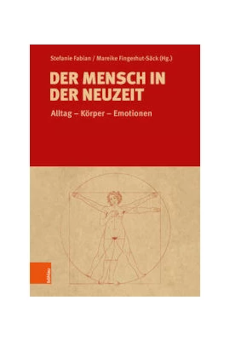
|
New publication: Der Mensch in der Neuzeit by Stefanie Fabian and Mareike Fingerhut-Säck
Historical anthropology deals with the human horizons of experience in their historical manifestations. In doing so, it understands humans as interpreting and acting beings and perceives them as a decisive factor for historical dynamics and the course of history. This research perspective runs through the volume as a guiding principle and structures the epistemological interest of the contributions. On the basis of the topics of everyday life, body and emotions, the authors provide exemplary insights into the human being(s) in the modern era, which is ostensibly brought into focus here in the sense of cultural history in its specificity, complexity and dependence on nature, society and cultural tradition. The thematic richness of facets - from women at sea, the fear of thunderstorms, or the principles of training male obstetricians, to images of the body in 18th-century lists of thieves, to the rejection of female physicians by male physicians - not only reflects the remarkable range of Eva Labouvie's research interests, to whom this book is dedicated on the occasion of her 65th birthday, but also demonstrates, as it were, the diversity and connectivity of a modern historiography oriented toward cultural studies and gender history. "Der Mensch in der Neuzeit" |
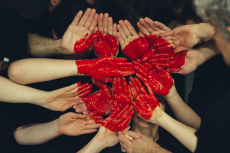
|
War as a lived reality - perspectives of feminist peace and conflict research
Russia's attack on Ukraine keeps Europe in suspense and triggers many questions and camp conflicts between further countries and also within individual states. On the occasion of the Anti-War Day on September 1, gender-blog asked peace and conflict researcher Victoria Scheyer what perspectives feminist research has on the topic, and also addressed peacemaking and conflict resolution options. |

|
Annual Report of the Anti-Discrimination Agency: 28 percent of all incidents of discrimination take place in the workplace
In 2021, the Federal Anti-Discrimination Agency recorded 5617 reports of discrimination under the General Equal Treatment Act (AGG). This is the second highest number of reported discrimination cases since the Anti-Discrimination Agency was founded in 2006. Racial discrimination was reported particularly frequently, followed by discrimination based on disability and chronic illness. At 28 percent, working life ranked second among the areas in which the most cases were reported. Daily commitment to diversity, tolerance and inclusion remains essential. But: the high number of reported cases also shows that more and more people know their rights and defend themselves against discrimination. |
University and politics |
|
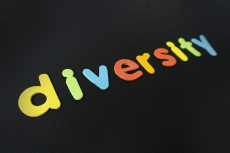
|
Queer themed afternoon at the HS Stendal
The project TransInno_LSA of the University of Applied Sciences Magdeburg-Stendal, the network RESPEKT and the Competence Center Gender Equitable Child and Youth Welfare invite you to the Queer Theme Afternoon on 19.10.2022 from 2.30 pm. You can find the whole program here. |

Vielen Dank für Ihr Interesse! Gern können Sie den Newsletter weiterleiten. Zur Registrierung senden Sie eine Nachricht an gleichstellungsbeauftragte@ovgu.de oder melden sich auf der Website an. Das Büro für Gleichstellungsfragen (BfG) der Otto-von-Guericke-Universität ist auch auf Instagram! |





